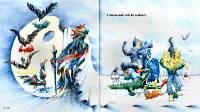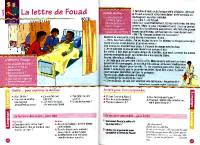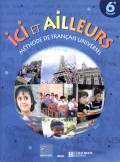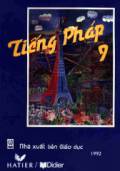| | You
are here : Chez Pierre >>
Vietnam >> Can Tho (1997-1999)
|

|
Vietnam
: | My
job in Can Tho (1997-1999) | |
|

Hervé
Fayet and Serge Cao on a visit in Can Tho | So
I was selected and hired by the APEFE (Association for the Promotion of the Education
and Training Abroad, branch of the French Community of Belgium). I
am paid, supported and evaluated by them, but I work, as a dozen other Belgians,
with the AUPELF-UREF for the "Bilingual Classes" project. Bilingual
classes ? A "delegate" program for the AUF (because not being of higher
education nor research) which takes a more and more important dimension. |
The bilingual classesBegun
in 1992 by Hervé Fayet (today Project manager for the South-Vietnam) with
6 classes, in 1997 this program touches already more than 500 classes (15 000
pupils) in Vietnam and the project extends in Laos and in Cambodia (as well as
Haiti, Vanuatu and Moldavia for the "strengthened French" classes).
| Usually, in Vietnam, children go to school
half of the day, notably because there are not enough classrooms to accomodate
all the pupils at the same time. But the children of the Bilingual
Classes stay all day long and learn all the subjects of the Vietnamese official
curriculum, plus about 10 hours of/in French per week. |
One of my schools : Tan An |
|
|
From 1st 'til 3rd grade, the children learn with the method
"Il était...une petite grenouille" ("There was... A little
frog") (Clé) which works on the 4 oral and written skills on base
of tales abundantly illustrated and accompanied with audio cassettes (story, dialogues,
songs...) |
|
|
|
|
In fourth and fifth grades, the children follow the method
"Ici et Ailleurs" ("Here and Somewhere else") ( IREFA) for
"international French" and "Ici au Vietnam" ("Here in
Vietnam") for the regional specificities as well as for the sciences in French
(math, physics, biology, geography...) |
|
|
|
In middle school, the pupils continue with "Ici et
Ailleurs", in which were added chapters dedicated to the knowledge of the
French-speaking world. They also have math and physics courses in French,
with teachers specialized in these disciplines. |
|
|
|
In cursus B, the pupils begin learning French in 6th grade
with the method "Tieng Phap" ("French language") ( Hatier). They
also have math and physics in French. (This "short" program was
closed -temporarily?- in September 2000) |
The demand is strong : the Vietnamese grant a great deal of importance to
the education of their children, and if English is attractive, French presents
many historic, cultural, scientific and...Material advantages.
That's right,
the AUF and the APEFE support very intensely this program of the Vietnamese Ministry
of the Education and Training by offering numerous equipments (a photocopier for
each school, TV, video, tape recorders; textbooks, French-speaking books, etc.),
advantages (the teachers of the bilingual classes are better paid and benefit
from a training) as well as the help and the expertise of the foreign administrative
and educational personnel.
|
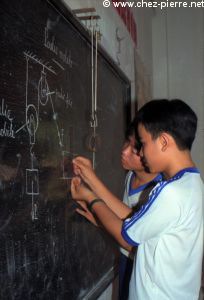
Physics
course in French | So you can imagine
that sometimes, there are more than 500 candidates for the opening of two classes
of 30 pupils... This limit of 30 was set to avoid the overpopulation observed
in the normal classes (sometimes more than 50 pupils by class). The recruitment
is made by "aptitude tests" during the summer, which allow to select
the "most capable" pupils. As for me...From
1997 till 1998, I handled the 40 bilingual classes of Can Tho , and both classes
of Vinh Long (about an hour and a half drive from Can Tho). It represented 38
teachers, about 1100 pupils in 9 schools (for the evolution in 1998-1999, see
the next page). My timetable :
mainly, visit the classes to observe, help, evaluate, motivate. These visits are
almost always followed by an individual meeting for remediation with the teacher. |
Another important moment is the weekly educational
meeting. Every Thursday, in Can Tho, I spent two to four hours with the teachers
of the various levels to help them prepare their lessons, to insure the coordination
and to complete their training. So Thursday was a hard day, from 7:00 am till
7:30 pm ! I also dedicated two to three half-days per week to the paperwork (papers,
reports, preparations, materials...) Regularly, I also played "moving
- delivering man" : some threads to fix a box on the motorcycle, and there
I go for a distribution of materials in the classes. With the heat, transporting
boxes of books is a true pleasure... |
Often, there were activities on the side : invitations, French
speakers club, official ceremonies, extracurricular activities, parents's meetings,
etc. These almost always took place on Sundays... At 7 o'clock
in the morning. Once a month, I had a meeting with the Service
of Education of the Province. Once by quarter, we had a national
meeting, which grouped all the advisors and both Project managers for a few days. |

Speeches...quickly
become a custom ! |
Situation
in the classesWaow... I was very impressed as soon
as my first visits (97 in a month). The methods are good and the teachers, for
the greater part, use the most modern communicative techniques. The pupils learn
well ! They are more disciplined than in Europe (and way more than in the USA
!) but a little bit the other way : the biggest problems here are met in the small
classes (1st , 2nd). Then, the pupils calm down and auto-discipline themselves.
|

Mr
Trung, dynamism included... | So the
pupils learn well, supported by their parents who are very demanding. Besides
the "loaded" school schedules (it happens that the pupils stay in school
from 7:00 am till 17:30 pm), the Vietnamese kids dedicate a lot of time to
homework and to the additional courses (often two hours a day in addition of Saturdays
and/or Sundays) or in other activities (music, sport...) Of
course there are exceptions (parents who work all the time and/or neglect their
children), but the majority could give us many lessons ! Let's
also consider the learning conditions... If the Bilingual Classes are often better
provided than the others, the premises are often unsuitable for a quality education. |
| Most
of the schools are still in pathetic condition, often wedged between boulevards
and/or intrusive markets... Ruined, too small classes; walls
where one guesses an ancient coat of paint, ceilings which subside and sometimes
allow water to pass through... Blackboards which flake (or
even full of holes), heat (many times 40° with 95 % of humidity while more
than a third of the classes has not a ventilator), very damaged and dirty benches... Omnipresent
noise (I often can't hear what the teacher says)... |
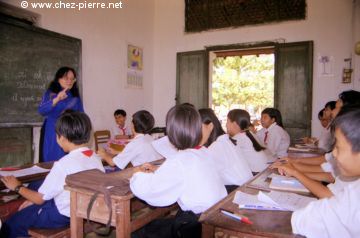
Mrs
Diep defies all the obstacles to stimulate her class,
and one sees the results
! |
My big problems for the job
? At first, the heat. I often leave at 7:00 am from my home, on the motorcycle.
Shirt and trousers are often dipped after 10 minutes in class. In itself it is
already (very) annoying, but when I leave after the lesson to work in another
school, I expose myself to the wind... I was dipped + wind with the motorcycle
= cold ! Regular colds in a city where it's almost never below 25° C, what
a joke ! Then, the quantity (of classes, teachers) : that lowers the quality.
The appointment of Vietnamese educational advisers, who should replace us bit
by bit to insure the continuation of the program, has been awaited for a long
time already...

Page créée le 27 novembre 1998 - Mise à jour le
13 juillet 2002
©opyright 1997-2007
Pierre Gieling - tous droits réservés

visitors
| |




























